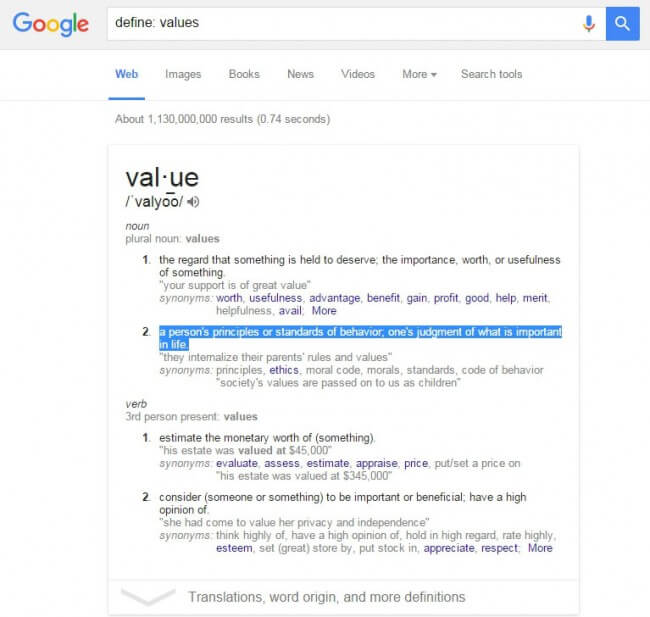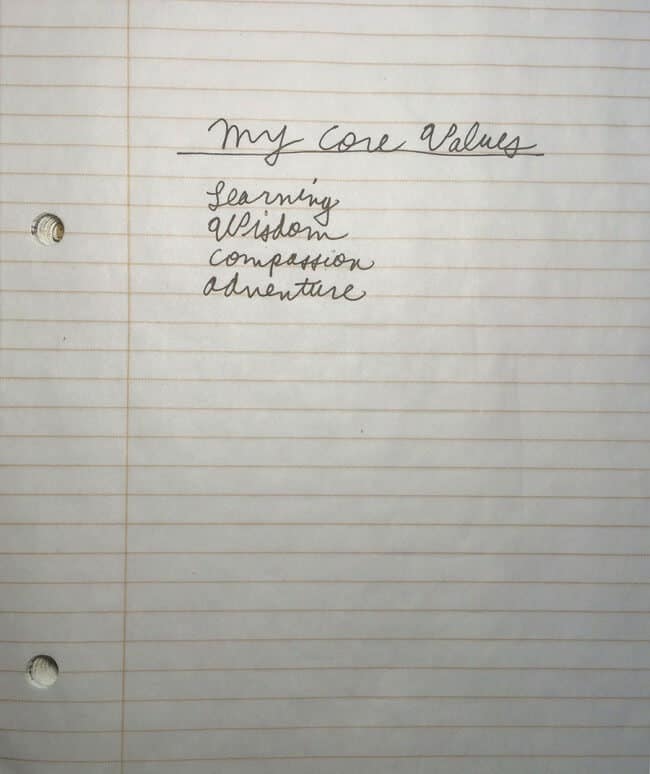Ever get the feeling that you’re just going through the motions of life without really living?
I know I have. A couple months ago, I reached a point where I felt that while I was having success in my academic pursuits and online business endeavors, I still felt…empty.
“Why does any of this even matter?” I wondered. “Why am I struggling toward these temporary goals that I probably won’t even remember five, ten, fifteen years from now?”
By conventional measures, I was successful, but it didn’t mean anything to me.
Deep stuff, right? Probably not the kind of thing you worry about every day (calculus homework and the cliffhanger ending of Rick and Morty Season 2 fit better in that category), but if you haven’t had to think about these things yet, it’s just a matter of time.
I wasn’t quite sure how to deal with this feeling for a while, but then I came across James Clear’s 2014 Integrity Report.
This post was a revelation to me. I read a lot about online business, career, success, and high achievement, but very rarely do I see any of those goals connected to meaningful reasons.
James’s post was the first attempt I had seen to root business and life goals in clearly defined values that were more altruistic than “making money” and more specific than “helping others.”
I knew this was the sort of change I needed to make to my own life, but like many important things, I left it in the back of my mind as one of those things I would “get to when I had time.”
What really changed everything for me was seeing author David Foster Wallace’s 2005 Kenyon College commencement address, “This Is Water.”
Unlike a lot of commencement addresses which attempt to inspire graduates and tell them all the great things they will do, Wallace is brutally honest about the boredom and petty frustration that are a part of adult life. He aims to tell grads the reality of what they’ll face while offering his best advice on how to deal with it.
The line from the speech that most stuck out to me, though, was this one:
“…the so-called real world will not discourage you from operating on your default settings, because the so-called real world of men and money and power hums merrily along in a pool of fear and anger and frustration and craving and worship of self.”
I know this sounds like really dark stuff, but Wallace’s point is that each of us has the freedom to reject these “default settings” and create meaning based on something better. What exactly is “better” is up to you (more on that in a moment), but the point is that you have a choice other than the default, and if you don’t choose, “the so-called real world” will not discourage you.
But before we go any further, we should clarify what exactly “values” are.
What Values Are Not

Defining values is not an easy task.
The second definition given by Google is not a bad start:
“a person’s principles or standards of behavior; one’s judgment of what is important in life.”
But it leaves much to the imagination and doesn’t adequately emphasize what values are not.
Values are not:
- (Necessarily) based in religion. Your religion may inform all or some of your values, but you can form values entirely independent of religion. Being religious does not necessarily guarantee a personally defined set of values.
- Goals. When you set a goal, you (ideally) have a Specific, Measurable, Attainable, Realistic, Time-sensitive (SMART) outcome in mind. But values aren’t about outcomes, at least not innately. Having certain values may lead you to make certain decisions which lead to certain outcomes (more on this in the a later section), but values do not begin with a specific end in mind. Values are about the way you want to live and be, not about what you do or accomplish.
- Set in stone. Something’s probably not right if you’re changing your values every day, but it’s natural for what you value to evolve over time as you learn and experience more. View defining your values as an evolving process, not as a concrete code.
Keep these principles in mind as you go about discovering your values.
Why Define Your Values?
“Most people never take the time to think about their values, write them down, and clarify them. Maybe it sounds too simple or unnecessary.”
– James Clear
Maybe you’re not convinced that defining your values is something that really matters, and that’s totally understandable. This can all easily sound vague, unscientific, and a waste of time.
In this section, I hope to dispel your doubts by presenting three reasons you should consider defining your values:
- To improve your mental and physical health
- To live life on your own terms
- To make difficult decisions easier
Health

You might be surprised to learn that there is research-backed evidence for why defining your values is important.
Once again, here’s James Clear (quoting Stanford University professor Kelly McGonigal):
“In the long term, writing about values has been shown to boost GPAs, reduce doctor visits, improve mental health, and help with everything from weight loss to quitting smoking and reducing drinking. It helps people persevere in the face of discrimination and reduces self-handicapping. In many cases, these benefits are a result of a one-time mindset intervention. People who write about their values once, for ten minutes, show benefits months or even years later.“
Sounds pretty impressive, right? Who wouldn’t want benefits like these? Defining your values can literally improve your health. And it’s a whole lot easier than cutting back on pizza.
This quote also makes the point that defining your values doesn’t require spending prolonged periods of self-reflection atop a snow-capped mountain (though if you do, that’s totally badass, and I want to see pictures). Even just spending ten minutes once led to the impressive results McGonigal describes.
A Life Well-Lived

Regardless of your beliefs about the afterlife or reincarnation, you only get to live this (particular) life once.
Let’s be generous and assume that you live a long human life of 90 years. That means you get 1080 months, 4680 weeks, or 32,850 days.
90 winters, springs, summers, and falls.
It seems infinite, but it is decidedly finite, as images like this life calendar remind me.
Knowing this, it would be a shame to live your life based on blind acceptance of someone else’s values, especially if those values are, for lack of a better word, kind of shitty.
It goes back to the David Foster Wallace quote I used earlier. If you don’t define your values, society gives you some pretty crappy default ones.
Default societal values include:
- consumerism
- self-centeredness
- pride
Pretty awful ways to live, right? But if you don’t think about what you want your values to be, it’s very easy to slip into these defaults. We all engage in these behaviors sometimes (it’s part of being human), but ideally they are the exception, not the rule.
To live a satisfied life, you must define a better code than the default.
Easier Decisions

Life is full of hard choices. These aren’t necessarily hard because of the potential outcomes, but rather because of the ambiguity involved. Many times you will find yourself choosing not between one bad thing and one good thing, but between two good things.
Hard decisions most of us face or will face include:
- Choosing a job
- Choosing a romantic partner
- Choosing how to spend our money
When you define what you value, these become easier decisions.
For instance, let’s say you’ve built a killer resume, done some serious networking, and become a job interview pro.
As a result, you find yourself with offers for two “great” jobs, one at Meeseeks Industries and the other at Gazorpazorp Inc. Both pay a handsome salary of 60,000 shmeckels a year, both are at cool, innovative companies, and both offer great benefits. Oh, and both have indoor waterslides. We’ll also assume that both are in the same city and an equal distance from where you live.
How are you to choose between two seeming dream jobs? You could always flip a coin, but a better way you might not have thought about is to examine the companies’ values.
You do some research and find out that despite their slick online presence and supposed commitment to philanthropy, Meeseeks Industries has been up to some seriously unethical business involving cloning. Gazorpazorp Industries, on the other hand, gives away 10% of its profits to a charity that helps connect young men with absentee fathers to positive male role models.
Knowing that you value helping others and giving away your excess wealth, your decision becomes much easier and Gazorpazorp Industries is your obvious choice.
This wasn’t the most realistic example, but I hope you see how having well-defined values can help you make choices between two options that seem equally positive.
(If you’re really confused at this point, just watch Season 1 of Rick and Morty, and everything will make sense.)
If you’re still not convinced, that’s totally cool–after all, who am I to tell you how to live your life? 😉
If, however, you’ve decided that defining your values is something you want to try, then read on for the all the details on how to do it.
How to Define Your Values
As I said earlier, this doesn’t have to be a long, profound process. All you need to define your values are 10 minutes and the writing tool of your choice.
Set a timer for 10 minutes and write down what you value. These can be fairly general, but make sure they’re personal. No one else is going to read these, so write what truly matters to you, not what you think ought to.
If you need some inspiration, James Clear has a list of common core values list of common core values you might consult.
Go do it right now. Don’t read any further until you have.
When I did the exercise myself, here’s what I came up with. I include these only to show that I follow my own advice, not to influence your choices.

How to Live Your Values
“The idea behind this method is that if we live and work in alignment with our values, then we’re more likely to live a life we are proud of rather than one we regret.”
– James Clear
While simply defining your values can have profound impacts on your health and well-being (as we saw earlier), your values have the most meaning if you live them out in your everyday life.
Like most things you want to do, living your values is a habit. Like most habits you want to build, you usually start out strong and then get totally derailed once the smallest thing goes wrong.
Here are a few ideas for avoiding that common pitfall and living out your values every day:
- Consult your values list at least once a week, if not every day. I find Friday to be a good day to do this, as it’s also the day I do my weekly review.
- Create a “now page” on your website listing your values and current priorities. By making a public online declaration of what you value, you hold yourself accountable to actually live those values. Check out Episode 82 of College Info Geek Podcast for more information on how Thomas is using this. If you don’t have a website, here’s how to start one.
- Keep a daily journal. I’m not as regular about this as I want to be, but I find that when I do take the time to reflect on my life in writing, I’m more aware of how my actions align with my values. See this post from Brain Pickings for some serious inspiration on how and why to keep a diary.
- Meditate for a few minutes each day. Close your eyes and focus on your breathing. It’s hard to explain exactly why this is such a powerful self-reflective tool, but trust me, it puts you very much in tune with how you currently feel about your life.
In addition to the above, any kind of self-reflection that makes sense to you will help keep you aware of whether or not you’re living in accord with your values.
The Journey Begins

This post is meant to be the beginning of a journey of self-reflection and more mindful living. I hope it has given you some of the tools needed to live your life with more purpose and integrity.
I am but the most basic of beginners in this area myself. While wisdom is one of my core values, I am the first to admit that I have glimpsed it only through the insight of others.
I welcome any thoughts or suggestions you have on this broad, complex, rewarding topic, and I’d love it if you’d share them in the comments below.
———————–
Photo Credits: Featured Image by Negative Space, Avocado and Mango by David Di Veroli, Hammock by Zach Betten, Diverging Paths by Jens Lelie, and Map by Sylwia Bartyzel


